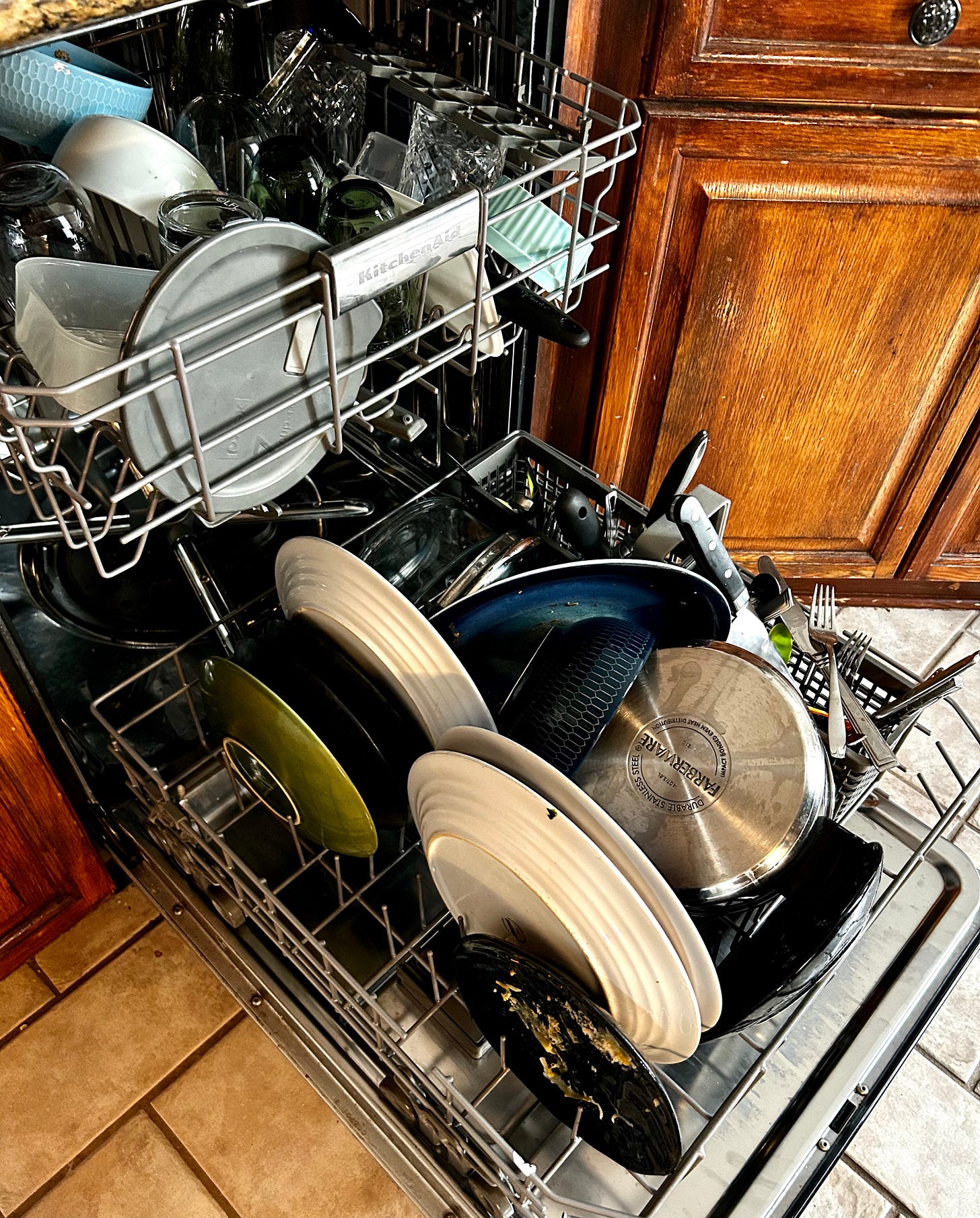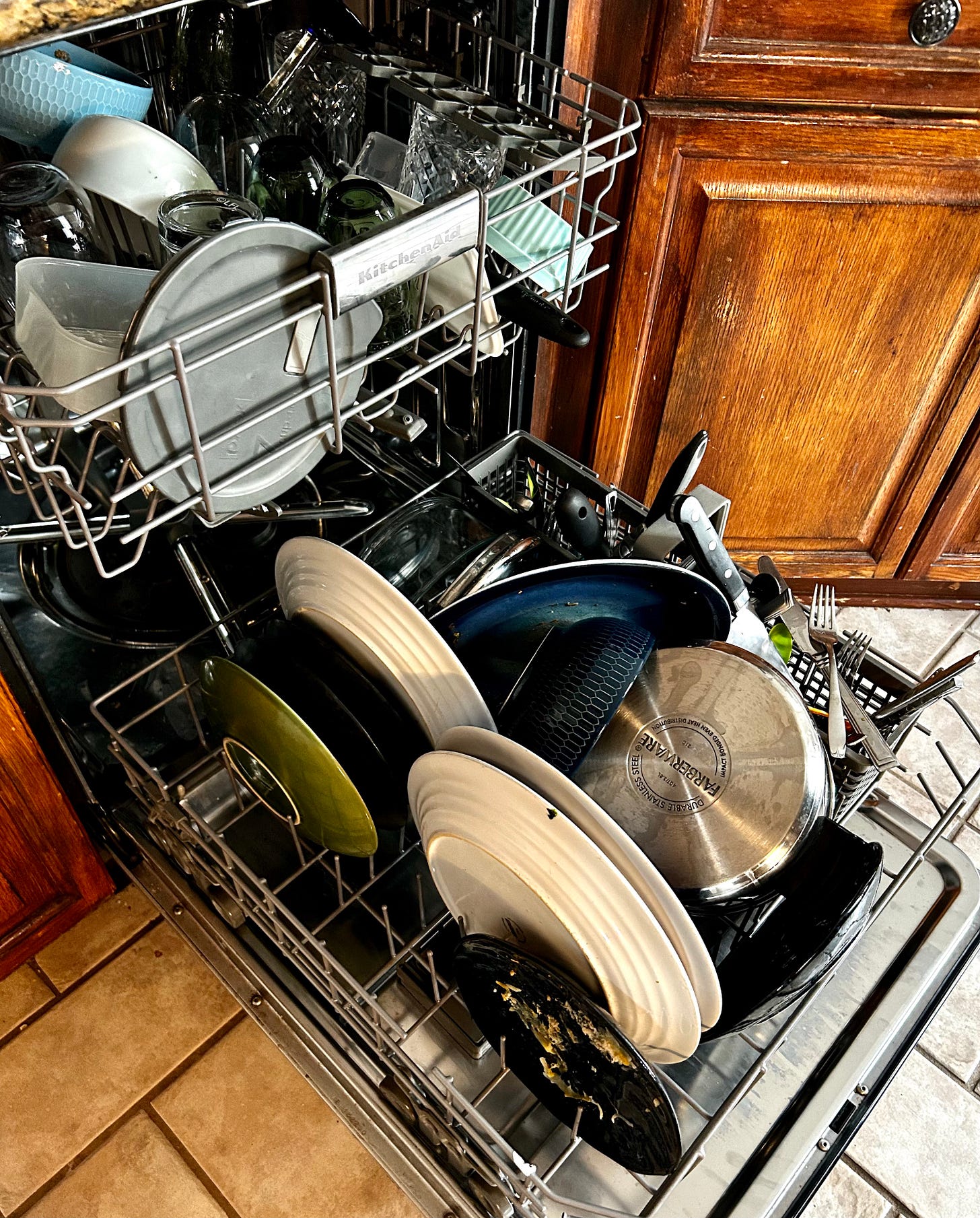How Each Generation Does Better Than the One Before It...
...or why my kids can't load the dishwasher right.

I have this idea that every generation improves on the last one. This is not based on robust statistics but my narrow experience of anecdotal evidence, so take the following thoughts as musings, not hard data.
My ancestors of the past several generations started off poor.
My maternal grandmother grew up in an orphanage with her six siblings. My dad’s parents lived in government housing when they had their first two children. One great-grandmother told stories of growing up in a family of twelve or thirteen children and never wanting her own because she hated the idea of being that poor again. Unlucky for her but fortunate for me, birth control was unreliable; she had my grandfather. These anecdotes largely take place during the Great Depression, so I’m sure they’re not rare. Lots of people were poor.
My grandparents, aided by the World War II economic boon, worked hard to dig themselves out of their childhood circumstances. However, they didn’t emerge from the Depression or the war with much emotional intelligence. Maybe it was because they had to buckle down and survive. They were accustomed to worrying over a dwindling food supply in the pantry. They were used to doing without for the war effort, and they bore the scars of that war stoically, as they had borne all the hardship before it.
My parents’ generation, growing up in a more economically viable time, didn’t get a lot of emotional recognition.
There was, “Oh you think you have it tough? Try living through a Depression. Try growing up in an orphanage.” And so they, those children of the fifties and sixties had a stronger foundation financially — parents who could always feed them and saved money to send them to college. But they were emotionally undernourished.
My generation rediscovered the language of emotional intelligence, the value of recognizing feelings. We have our parents to thank for this. They may not have known how to validate our emotions, but they sensed, they knew, not to repress them as their parents had.
In this way, each generation has built a better nest for their offspring than they themselves had.
You can see the evidence in how each of us behaves — how my grandfather used to give the groan-worthy “Kids today don’t know the value of a dollar” speech. It makes sense; a dollar was less valuable to us than it was to him, and not just for inflation but because we didn’t grow up feeling hungry all the time.
My parents used to clam up in the face of strong emotions; when yours weren’t recognized as a child, or when they were subverted for the feelings of the adults in charge, you don’t develop those coping skills.
I still struggle with what to do with those emotions, even though I can identify and value them. My own children have a cushier childhood than even I had, with the generational wealth we’ve accumulated, all the benefits of modern technology and the advantage of two generations before them stumbling through what to do with all of the feelings. But nowhere is this evolution of the ages more apparent than in…
The Dishwasher
I do not know how loading the dishwasher is related to this other stuff I’ve rambled about for eight paragraphs, but there is a correlation. Maybe. If I took the time to collect data instead of guessing. I’ll stick with guessing. Here goes:
My grandparents didn’t have automatic dishwashers growing up, but somewhere in there, evolution set us on a multigenerational quest. Figure out how to situate plates, cups and especially Tupperware containers inside the apparatus that cleans them, so they emerge sparkling, free of dried food and without a cesspool of dirty detergent sludge in the bottom of them.
When I went to college, my mom made me a poster of various pictures of dishwashers cut from magazines with arrows pointing to them. She said that after all these years, she was afraid I wouldn’t make it in the world. I still didn’t seem to know where the dishwasher was, so how could I have even begun to comprehend how to put dishes in it? The poster was her last-ditch effort to reach me as I went out into the world on my own.
For my part, I don’t remember leaving dirty dishes all over the house, but I don’t remember putting them in the dishwasher either, so awareness was part of the problem. Perhaps the first step to proper dishwasher loading is realizing there are dirty dishes left over after you finish a snack. Admit you have a problem. Somewhere I must have developed at least remedial skills in this area because today I, the D student of dishwashers, have become the master.
My kids, in some ways, are prodigies.
At the tender ages of just 11 and 14, they have located the dishwasher in our kitchen and manage to get their dishes in it about 75 percent of the time. However. They seem unsure as to how to proceed once the appliance has been found. They resort to opening the door two inches and flinging their cup, plate or fork into the cavern to fall where it may — on top of other dishes, right side up in water-collecting stance or, in the case of utensils, in the black hole under the bottom rack, never to be seen again. We’ve given lessons and pointed out the tines that should hold the plates all going in one direction, but to no avail. Perhaps that is a task for the next generation.
Someday, if my kids have kids, maybe I will smile in appreciation as I watch them open the dishwasher all the way and carefully install their utensils in the cubbies designed for them. Perhaps they will even rinse the peanut butter off the knife before placing it there. Maybe my grandkids will also easily talk about feelings and sex and gender like they’re discussing what they watched on the hologram TV last night. Seriously, it could happen.
We each improve on the previous generation and have our parents — the platform they gave us — to thank for it. Whether we’re talking about Depression, depression or how to put a goddamned Tupperware in the upper rack.


